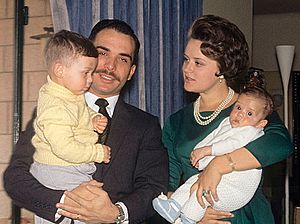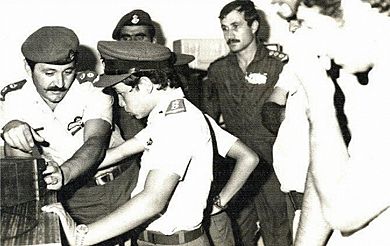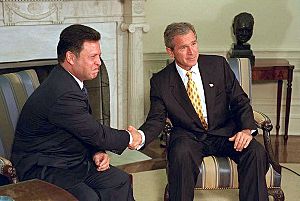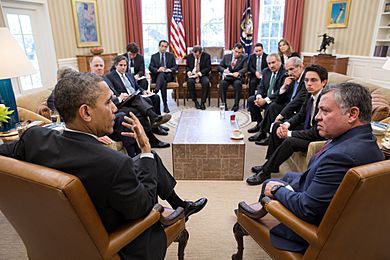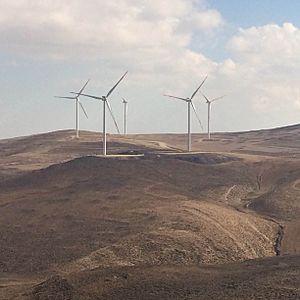Abdullah II of Jordan facts for kids
Quick facts for kids Abdullah II
|
|||||
|---|---|---|---|---|---|
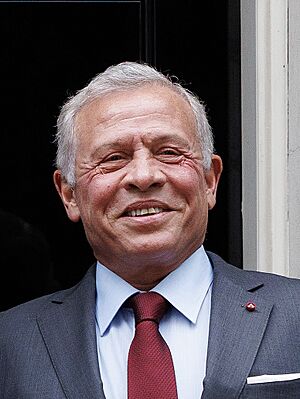
Abdullah II in 2025
|
|||||
| King of Jordan | |||||
| Reign | 7 February 1999 – present | ||||
| Enthronement | 9 June 1999 | ||||
| Predecessor | Hussein | ||||
| Heir apparent | Hussein | ||||
| Prime ministers |
See list
Fayez Tarawneh
Abdelraouf Rawabdeh Ali Abu Al-Ragheb Faisal Al-Fayez Adnan Badran Marouf al-Bakhit Nader Al-Dahabi Samir Rifai Marouf al-Bakhit Awn Al-Khasawneh Fayez Tarawneh Abdullah Ensour Hani Mulki Omar Razzaz Bisher Khasawneh Jafar Hassan |
||||
| Born | 30 January 1962 Amman, Jordan |
||||
| Spouse | |||||
| Issue Detail |
|
||||
|
|||||
| House | Hashemite | ||||
| Father | Hussein Bin Talal | ||||
| Mother | Muna Al Hussein | ||||
| Religion | Sunni Islam | ||||
| Signature |  |
||||
| Military career | |||||
| Service/ |
|
||||
| Years of service | 1982–present | ||||
| Rank | Field Marshal | ||||
| Commands held | Commander-in-chief | ||||
Abdullah II (born 30 January 1962) is the current King of Jordan. He became king on 7 February 1999. He is part of the Hashemites family, who have been the royal family of Jordan since 1921. His family is traditionally seen as direct descendants of the prophet Muhammad.
Abdullah was born in Amman, Jordan. He was the first child of King Hussein and his wife, Princess Muna. As the king's oldest son, Abdullah was expected to become king. However, in 1965, King Hussein named Abdullah's uncle, Prince Hassan, as his heir instead. Abdullah started school in Amman and later studied abroad.
He began his military career in 1980 in the Jordanian Armed Forces. He later took charge of the country's Special Forces in 1994. By 1998, he was a major general. In 1993, Abdullah married Rania Al-Yassin. They have four children: Crown Prince Hussein, Princess Iman, Princess Salma, and Prince Hashem.
Just weeks before his death in 1999, King Hussein changed his mind and named Abdullah as his heir. Abdullah became king after his father passed away. As a constitutional monarch, Abdullah has many powers. He worked to improve Jordan's economy when he became king. His changes led to a period of strong economic growth until 2008.
Later, Jordan's economy faced challenges due to global economic problems and events in the Arab world. In 2011, protests happened in many Arab countries. Abdullah quickly responded to protests in Jordan by changing the government and introducing reforms. He also worked to promote peace between different religions. He is the longest-serving Arab leader today. He is also the guardian of Muslim and Christian holy sites in Jerusalem.
Contents
Early Life and Family
Abdullah was born on 30 January 1962 in Amman, Jordan. His parents were King Hussein and his second wife, Princess Muna Al-Hussein. He was named after his great-grandfather, Abdullah I, who founded modern Jordan. His family, the Hashemites, ruled Mecca for over 700 years. They have ruled Jordan since 1921. The Hashemites are the oldest ruling family in the Muslim world.
Abdullah was King Hussein's oldest son. This meant he was supposed to become king under Jordan's rules. But because of political problems, King Hussein chose Abdullah's uncle, Prince Hassan, to be his heir in 1965.
Abdullah started school in 1966 in Amman. He then went to schools in England and the United States. He has four brothers and six sisters. Seven of them are his half-siblings.
Military Career and Training
Abdullah began his military training at the Royal Military Academy Sandhurst in England in 1980. After Sandhurst, he became a second lieutenant in the British Army. He served for a year in Britain and West Germany.
In 1982, Abdullah studied Middle Eastern affairs at Pembroke College, Oxford. When he returned to Jordan, he joined the Royal Jordanian Army. He served in different roles, including platoon commander and tank company commander. He also trained to fly Cobra attack-helicopters with the Royal Jordanian Air Force.
In 1987, he studied international affairs at Georgetown University in Washington, D.C. He continued to rise through the ranks in the Jordanian army. In 1993, he was promoted to colonel.
Abdullah met Rania Al-Yassin in January 1993. They got engaged two months later and married in June.
In 1994, Abdullah took command of Jordan's Special Forces. He reorganized them into the Joint Special Operations Command in 1996. By 1998, he was a major general. He even led a special forces mission to catch criminals, which was very successful.
Becoming King
Taking the Throne
Abdullah often joined his father, King Hussein, on important trips. These included meetings with leaders from other countries. During the 1990s, Abdullah sometimes acted as regent (a temporary ruler) for his father.
In late 1998, King Hussein returned to Jordan after being away for medical treatment. On 24 January 1999, just two weeks before he passed away, King Hussein made a surprising decision. He changed his heir from his brother Hassan to his son Abdullah. Abdullah himself was surprised, as he thought he would spend his life in the military.
King Hussein died on 7 February 1999. Hours later, Abdullah went to an emergency meeting of the Jordanian parliament. He took the same oath his father had taken almost 50 years before. Abdullah's official ceremony to become king happened on 9 June 1999. He and his wife, Rania, rode through Amman. Rania became the youngest queen in the world at 29 years old.
First Years as King
As king, Abdullah has a lot of power in Jordan. He is the head of state and the leader of the Jordanian Armed Forces. He also chooses the prime minister and the heads of security agencies. The prime minister then chooses the rest of the government.
Jordan's parliament has two parts: the appointed Senate and the elected House of Representatives. However, many seats in the House are held by people who support the king. The king also appoints the Senate members.
When Abdullah became king, many people wondered if he could fix Jordan's economic problems. These problems were left over from the 1990 Gulf War. Abdullah continued his father's policy of being friendly with Western countries. He supported the 1994 Israel–Jordan peace treaty. Other countries, like the United States, increased their help to Jordan.
In his early years as king, Abdullah often went undercover to see Jordan's problems for himself. He said that government workers were "terrified" when he did this. In November 1999, Abdullah took action against the Hamas group in Jordan. He sent four Hamas officials out of the country and closed their offices.
The September 11 attacks in 2001 were strongly condemned by Abdullah. Jordan quickly helped the United States by making new laws against terrorism. Jordan's intelligence agency also stopped other planned attacks.
Challenges in the 2000s
When the United States planned to attack Iraq in 2003, Abdullah was against it. He warned that an attack would be "disastrous" for Iraq and the whole region. He tried to convince President George W. Bush not to invade Iraq. Jordan had received cheap oil from Iraq, which helped its economy.
Even though he disagreed with the invasion, Abdullah allowed American missile systems to be placed in the Jordanian desert. But he did not let other countries use Jordan as a base to invade Iraq.
The 2003 Jordanian general election was the first parliamentary election under Abdullah's rule. He had postponed it for two years due to regional problems. Before the election, Abdullah made a change to the law. This change gave women six guaranteed seats in Parliament.
In 2004, Abdullah used the term "Shia Crescent". He used it to describe a region from Damascus to Tehran where Shia groups had a lot of influence. He later explained he meant a shift in political power, not just religious groups.
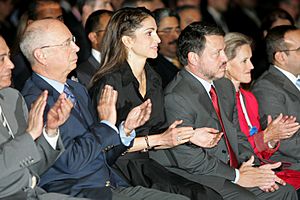
On 9 November 2005, a terrorist group called Al-Qaeda in Iraq attacked three hotels in Amman. This was the deadliest attack in Jordan's history, killing 60 people. The leader of the group, Abu Musab al-Zarqawi, was later killed with help from Jordanian intelligence. Jordan increased its security after the attack.
In 2007, Abdullah opened King's Academy near Madaba. It was the first boarding school in the Middle East. He wanted to give students a good education, similar to what he received.
By 2007, Jordan was hosting 800,000 Iraqi refugees. Most of them have since returned to Iraq. In 2008, Abdullah became the first Arab leader to visit Iraq after the 2003 American invasion.
The Arab Spring and Beyond (2010s)
Responding to Regional Changes
In December 2010, protests began in Tunisia and spread to other Arab countries. This period became known as the Arab Spring. In Jordan, people also protested, asking for reforms. On 1 February 2011, Abdullah responded by changing his government and promising to move towards more democracy.
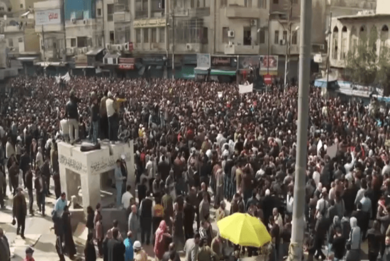
The protests in Jordan were mainly about economic problems like high prices and unemployment. Most protesters wanted changes to the government, not an end to the monarchy. Abdullah made several changes to the government and introduced reforms. He changed about one-third of the constitution. He also created a Constitutional Court and an Independent Election Commission.
In November 2012, the government cut fuel subsidies, which made prices go up. This led to large protests. The decision was later reversed. Abdullah called for an early parliamentary election in January 2013. He also published several papers explaining his ideas for democracy in Jordan.
In December 2012, Abdullah was the first head of state to visit the West Bank after the United Nations General Assembly voted to give the Palestinian Authority a new status. Jordan believes that an independent Palestinian state is very important for peace.
Dealing with Regional Conflicts
The Syrian Civil War started in March 2011. This caused many refugees to cross into Jordan from Syria. At one point, about 3,000 refugees arrived each day. Abdullah warned that the large number of refugees was putting a huge strain on Jordan.
In June 2014, Abdullah expressed concern that the problems in Iraq would spread across the region. Jordan began building barriers along its borders with Iraq and Syria. Jordanian border guards have stopped many attempts to cross illegally. Jordan also helped train and arm Syrian rebel groups.
In April 2014, the Islamic State in Iraq and the Levant (ISIL) threatened to invade Jordan. In August 2014, thousands of Iraqi Christians fled ISIL and found safety in Jordan.
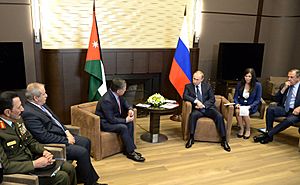
Jordan joined the international fight against ISIL in September 2014. In December 2014, a Jordanian fighter jet crashed in Syria. On 3 February 2015, a video showed the captured Jordanian pilot, Muath Al-Kasasbeh, being burned to death by ISIL. This act caused great anger in Jordan. Abdullah quickly ordered the execution of two imprisoned terrorists. He then launched "Operation Martyr Muath," a series of airstrikes against ISIL targets. He was called "The Warrior King" for his strong response.
In January 2016, Abdullah said that Jordan was at a "boiling point" because of the Syrian refugees. Jordan claimed that over a million Syrians had sought refuge there. He warned that the country's resources were stretched thin.
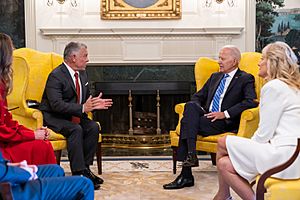
The November 2016 Jordanian election used a new system that encouraged more political parties to take part. This was seen as a step towards a government where political groups, not just the king, choose the prime minister.
After Donald Trump became US president in January 2017, Abdullah visited the US. He was concerned about the new administration's views on the Israeli–Palestinian conflict. He reportedly convinced Trump to change his policy on Israeli settlements. Abdullah also criticized the US decision to recognize Jerusalem as the capital of Israel.
In June 2018, Prime Minister Hani Mulki resigned after large protests against tax increases. Abdullah appointed Omar Razzaz as the new Prime Minister. In August 2018, after the US stopped funding for a UN agency helping Palestinian refugees, Abdullah worked to find new funds.
Recent Events (2020s)
In May 2020, Abdullah criticized Donald Trump's peace plans for the Middle East. He said that a "two-state solution" (where Israelis and Palestinians have their own states) is the only way forward. He warned that Israel taking over parts of the West Bank would cause more conflict.
In October 2020, Omar Razzaz resigned as prime minister. Abdullah then appointed Bisher Al-Khasawneh to form a new government. After Joe Biden won the 2020 US presidential election, Abdullah was the first Arab leader to congratulate him.
In April 2021, Abdullah ordered the arrest of his half-brother, Prince Hamzah bin Hussein, and others. This was called "sedition." Abdullah later said that the family issue was resolved and Hamzah was safe.
On 19 July 2021, Abdullah visited US President Joe Biden at the White House. They talked about the Middle East, fighting COVID-19, and the relationship between Jordan and the US.
On 3 October 2021, Abdullah spoke with Syrian president Bashar al-Assad by phone. This was their first contact since the Syrian civil war began. They discussed relations after Jordan fully opened its borders with Syria.
In October 2023, Abdullah condemned Israel's blockade of the Gaza Strip and the "collective punishment" of Palestinians during the Gaza war. In February 2024, he called for an immediate ceasefire. He also warned against a proposed attack on Rafah, saying it would cause another humanitarian disaster. Abdullah and the Jordanian government helped deliver aid to Gaza by airdrop. A video showed Abdullah personally taking part in one of these aid drops.
King Abdullah rejected a proposal for Jordan to take in Palestinians from Gaza. On 26 February 2025, he met with Syria's interim President Ahmed al-Sharaa in Amman. Abdullah condemned Israeli attacks on Syria.
Changes and Improvements in Jordan
Economic Growth
King Abdullah has worked to improve Jordan's economy. Jordan is a small country with limited natural resources like water and oil. This has led to government debt and unemployment. Jordan relies on help from other countries. When Abdullah became king, he started a plan to boost the economy. This plan helped Jordan's economy grow and improved people's lives. He helped attract money from other countries and supported new business areas like technology.
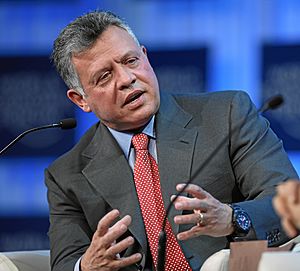
Abdullah signed a free-trade agreement with the United States. This was the first such agreement for the US with an Arab country. As a result, Jordan's exports to the US grew a lot. Jordan's foreign debt also decreased significantly. A study in 2014 called Jordan the "freest Arab economy."
The king started programs to provide housing for citizens, including teachers and soldiers. He also created awards to encourage good citizenship and excellence in government and business. To fight unemployment, he set up councils to train people for jobs.
Jordan used to depend on cheap oil from Iraq. But after the 2003 American invasion of Iraq, this supply stopped. Jordan then started importing gas from Egypt. However, attacks on the pipeline in Egypt caused Jordan to lose a lot of money. The global economic crisis and regional conflicts also hurt Jordan's economy. Tourism, which is very important for Jordan, dropped sharply.
Jordan's debt increased due to these challenges. Hosting Syrian refugees also cost Jordan a lot of money. Foreign aid only covers some of these costs. The government has started a plan to reduce Jordan's debt.
Political Reforms
In his early years, Abdullah was criticized for focusing more on the economy than on political changes. In 2005, a plan called the National Agenda was created to guide political reforms. However, it was not fully put into action due to opposition.
After the Arab Spring, a new election law was passed in 2012. This law allowed for more proportional representation in elections. Several changes were made to the constitution to limit some of the king's powers. A constitutional court and an Independent Election Commission were also created. Laws related to human rights and freedom of speech were also improved.
In 2016, changes to the election law led to fairer parliamentary elections. This caused an organization called Freedom House to rate Jordan as "partly free." In September 2016, Abdullah formed a committee to improve Jordan's justice system. The committee's recommendations, including better protection for women, were approved by Parliament. A new law for people with disabilities was also passed.
In August 2017, local elections were held for new councils. These councils were created to give more power to local communities and increase citizen participation.
In June 2021, Abdullah announced a new committee to modernize Jordan's political system. This committee proposed new laws for political parties and elections. It also suggested 22 changes to the Jordan constitution to improve parliamentary work and empower women and youth. In January 2022, the Jordan parliament approved constitutional reforms. These included improving women's rights and lowering the minimum age for elected officials to 25.
Military Modernization
Because of his military background, Abdullah believes in having a strong and modern military. He started the Jordan Design and Development Bureau. This company creates military products for the Jordanian Armed Forces. Abdullah has also modernized the army by getting advanced weapons and improving Jordan's F-16 fighter jets. The King sometimes trains with the Jordanian army in military drills.
Energy Development
Problems with the Egyptian pipeline that supplied gas to Jordan caused the country's electricity company to go into debt. This led Abdullah to push for a plan to get energy from different sources.
In 2007, Abdullah announced that Jordan planned to use its large uranium reserves to build nuclear reactors for electricity. In 2016, he opened Jordan's first nuclear facility. This facility helps train students in nuclear engineering.
Jordan has a lot of sunshine and good wind speeds. Abdullah has opened large wind and solar power projects. By 2017, over 200 MW of solar energy projects were completed. Jordan aims to generate 20% of its energy from renewable sources.
In 2014, Jordan signed a deal to import gas from Israel. This deal was controversial for some people. Separately, Abdullah opened a port in Aqaba in 2015 to import liquefied natural gas (LNG). Using LNG for electricity saves Jordan money and is better for the environment.
Religious Harmony
After the 11 September attacks, Abdullah issued the Amman Message in November 2004. This message encouraged Muslim scholars worldwide to speak out against terrorism and promote religious tolerance. In 2005, 200 leading Islamic scholars adopted the message. It emphasized that all eight schools of Islam are valid and that declaring someone an apostate (someone who has left their religion) is forbidden.
Abdullah presented the Amman Message to the United Nations General Assembly in 2010. He proposed a World Interfaith Harmony Week, which is now celebrated every year in February. He also created an award for interfaith dialogue.
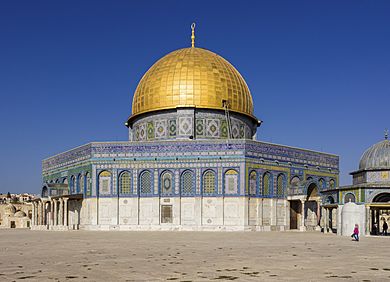
The Al-Aqsa compound in Jerusalem has been under the care of Abdullah's family, the Hashemites, since 1924. This means they are responsible for protecting Muslim and Christian holy sites there. In 2013, an agreement was signed between the Palestinian Authority and Abdullah to confirm this role.
In 2016, Abdullah announced he would pay for the restoration of the Tomb of Jesus in the Church of the Holy Sepulchre. His family has spent over $1 billion since 1924 on maintaining and renovating the Al-Aqsa Mosque.
In 2014, Abdullah welcomed Pope Francis to Jordan. This was the third time a Pope visited Jordan during his reign. Abdullah, Queen Rania, and Prince Ghazi accompanied the Pope to Al-Maghtas, the site where Jesus is believed to have been baptized.
Abdullah was ranked as one of the most influential Muslims in the world. In 2018, he received the Templeton Prize for his work in promoting understanding between different faiths.
Successor to the Throne
On 28 November 2004, Abdullah removed the title of crown prince from his half-brother, Prince Hamzah. Abdullah had appointed Hamzah as crown prince in 1999, following his father's advice. Abdullah explained that this change would give Hamzah more freedom. On 2 July 2009, Abdullah's son, Prince Hussein, became the new Crown Prince.
Personal Life
King Abdullah met Rania Al-Yassin at a dinner party in January 1993. They married on 10 June 1993 at Zahran Palace. King Abdullah and Queen Rania have four children:
- Crown Prince Hussein (born 28 June 1994), married Rajwa Al Saif on 1 June 2023. They have one daughter:
- Princess Iman bint Al Hussein (born 3 August 2024)
- Princess Iman (born 27 September 1996), married Jameel Alexander Thermiótis on 12 March 2023. They have one daughter:
- Amina Thermiótis (born 16 February 2025)
- Princess Salma (born 26 September 2000)
- Prince Hashem (born 30 January 2005)
Abdullah's half-sister, Princess Haya, was married to the ruler of Dubai, Sheikh Mohammed Al-Maktoum.
Abdullah wrote a book about his first ten years as king called Our Last Best Chance: The Pursuit of Peace in a Time of Peril. The book shares stories from his childhood and meetings with political leaders.
Hobbies and Interests
Abdullah enjoys skydiving, motorcycling, water sports, and collecting old weapons. He is also a big fan of the science-fiction series Star Trek. In 1996, he even had a small role in an episode of Star Trek: Voyager.
The king promotes tourism in Jordan. He was a tour guide for a TV show called Jordan: The Royal Tour. He mentioned that he is no longer allowed to skydive since becoming king. He also enjoys riding his Harley-Davidson motorcycle. His brother, Prince Ali bin Al Hussein, who leads the Jordan Football Association, says the king is the Jordan national football team's biggest fan.
Abdullah's interest in movies led him to create the Red Sea Institute of Cinematic Arts in Aqaba in 2006. When the movie Transformers: Revenge of the Fallen was filmed in Jordan, Abdullah helped by providing military helicopters to move equipment. In 2016, he honored the cast of Theeb, the first Jordanian film nominated for an Oscar.
Abdullah also likes stand-up comedy. He invited comedians to dinner when they visited Jordan for a festival. In 2013, a video of Abdullah helping push a car stuck in snow went viral. In 2017, another video showed him helping put out a fire near the royal palace.
Wealth and Properties
Abdullah owns properties around the world, valued at over $100 million. These properties were managed through companies in the British Virgin Islands. His ownership of these properties was revealed in the Pandora Papers leak. His lawyers stated that these properties were bought with his private money for security and privacy reasons. A 2022 leak also showed that Abdullah had secret bank accounts. The Royal Court explained that these funds came from selling an old plane that belonged to his father.
Honours and Awards
Honours
National honours
 Jordan:
Jordan:
 Grand Master of the Order of Al-Hussein bin Ali
Grand Master of the Order of Al-Hussein bin Ali Grand Master of the Supreme Order of the Renaissance
Grand Master of the Supreme Order of the Renaissance Grand Master of the Order of the Hashemite Star
Grand Master of the Order of the Hashemite Star Grand Master of the Order of Military Gallantry
Grand Master of the Order of Military Gallantry Grand Master of the Order of the Star of Jordan
Grand Master of the Order of the Star of Jordan Grand Master of the Order of Independence
Grand Master of the Order of Independence Grand Master of the Order of Military Merit
Grand Master of the Order of Military Merit Grand Master of the Order of Al Hussein
Grand Master of the Order of Al Hussein Founding Grand Master of the Order of King Abdullah II bin Al Hussein for Excellence
Founding Grand Master of the Order of King Abdullah II bin Al Hussein for Excellence Founding Grand Master of the Order of the State Centennial
Founding Grand Master of the Order of the State Centennial Sovereign of the Al-Hussein Medal of Excellence
Sovereign of the Al-Hussein Medal of Excellence Sovereign of the Long Service Medal
Sovereign of the Long Service Medal Sovereign of the Administrative & Leadership Competence Medal
Sovereign of the Administrative & Leadership Competence Medal Sovereign of the Administrative & Technical Competence Medal
Sovereign of the Administrative & Technical Competence Medal Sovereign of the Administrative & Training Competence Medal
Sovereign of the Administrative & Training Competence Medal
Foreign honours
 Grand Star of the Decoration of Honour for Services to the Republic of Austria (January 2001).
Grand Star of the Decoration of Honour for Services to the Republic of Austria (January 2001).
 Grand Cordon of the Order of Leopold (18 May 2016)
Grand Cordon of the Order of Leopold (18 May 2016)
 Grand Cross Special Class of the Order of Merit of the Federal Republic (10 October 2002)
Grand Cross Special Class of the Order of Merit of the Federal Republic (10 October 2002)
 Knight Grand Cross with Collar of the Order of Merit of the Italian Republic (9 February 2001)
Knight Grand Cross with Collar of the Order of Merit of the Italian Republic (9 February 2001) Knight Grand Cross of the Order of Merit of the Italian Republic (15 January 1987)
Knight Grand Cross of the Order of Merit of the Italian Republic (15 January 1987)
 Collar of the Supreme Order of the Chrysanthemum (30 November 1999)
Collar of the Supreme Order of the Chrysanthemum (30 November 1999) Grand Cordon of the Supreme Order of the Chrysanthemum (November 1993)
Grand Cordon of the Supreme Order of the Chrysanthemum (November 1993)
![]() Libya:
Libya:
- Member 1st Class of the Order of the Republic of Montenegro (2017)
 Knight Grand Cross of the Order of the Netherlands Lion (30 October 2006)
Knight Grand Cross of the Order of the Netherlands Lion (30 October 2006) Grand Cross of the Order of the House of Orange (7 December 1994)
Grand Cross of the Order of the House of Orange (7 December 1994)
![]() Oman:
Oman:
 Member Special Class of the Civil Order of Oman (4 October 2022)
Member Special Class of the Civil Order of Oman (4 October 2022) Collar of the Order of Al Said (22 May 2024)
Collar of the Order of Al Said (22 May 2024)
![]() Peru:
Peru:
 Knight of the Order of the White Eagle (26 September 1999)
Knight of the Order of the White Eagle (26 September 1999)
 Grand Collar of the Military Order of Saint James of the Sword (16 March 2009)
Grand Collar of the Military Order of Saint James of the Sword (16 March 2009) Grand Collar of the Order of Prince Henry (5 March 2008)
Grand Collar of the Order of Prince Henry (5 March 2008)
 Knight of the Collar of the Royal and Distinguished Spanish Order of Charles III (21 April 2006)
Knight of the Collar of the Royal and Distinguished Spanish Order of Charles III (21 April 2006) Knight of the Collar of the Royal Order of the Isabella the Catholic (18 October 1999)
Knight of the Collar of the Royal Order of the Isabella the Catholic (18 October 1999) Knight Grand Cross of the Order of Naval Merit, with white distinctive (15 September 1995)
Knight Grand Cross of the Order of Naval Merit, with white distinctive (15 September 1995) Knight Grand Cross of the Order of Aeronautical Merit, with white distinctive (23 December 1999)
Knight Grand Cross of the Order of Aeronautical Merit, with white distinctive (23 December 1999)
 Knight of the Royal Order of the Seraphim (7 October 2003)
Knight of the Royal Order of the Seraphim (7 October 2003)
 Member 1st Class of the Order of Merit (22 June 2011)
Member 1st Class of the Order of Merit (22 June 2011) Member 1st Class of the Order of Prince Yaroslav the Wise (23 April 2002)
Member 1st Class of the Order of Prince Yaroslav the Wise (23 April 2002)
 Honorary Knight Grand Cross of the Most Honourable Order of the Bath, Military Class (GCB, 6 November 2001)
Honorary Knight Grand Cross of the Most Honourable Order of the Bath, Military Class (GCB, 6 November 2001) Honorary Knight Grand Cross of the Most Distinguished Order of Saint Michael and Saint George (GCMG, 12 May 1999)
Honorary Knight Grand Cross of the Most Distinguished Order of Saint Michael and Saint George (GCMG, 12 May 1999) Honorary Knight Grand Cross of the Royal Victorian Order (GCVO, 13 November 2024)
Honorary Knight Grand Cross of the Royal Victorian Order (GCVO, 13 November 2024) Honorary Knight Commander of the Royal Victorian Order (KCVO, 26 March 1984)
Honorary Knight Commander of the Royal Victorian Order (KCVO, 26 March 1984) Recipient of the Sandhurst Medal
Recipient of the Sandhurst Medal
Honorary degrees
- 1 January 2001: Doctorate in political sciences, University of Jordan.
- 3 September 2004: Doctorate, International Relations Institute in Moscow.
- 21 March 2005: Doctor of Humane Letters for socioeconomic development in Jordan and promoting interfaith dialogue, Georgetown University.
- 15 December 2005: Doctorate in political sciences, Chulalongkorn University in Thailand.
- 4 June 2008: Doctorate in civil law, University of Oxford.
- 8 November 2011: Doctorate in humanitarian sciences for efforts in defending Jerusalem's holy sites, Al-Quds University (represented by Palestinian president Mahmoud Abbas).
Honorary military appointments
Awards
- 16 March 2002: Young Presidents Organisation's Global Leadership Award (California).
- 30 September 2003: Sorbonne Association for Foreign Policy award for political courage in France.
- 20 October 2003: Pioneer in E-Business award, Arab Business magazine (United Arab Emirates).
- 16 April 2004: INFORUM 21st-Century Award from the Commonwealth Club of California, awarded to young leaders who strive for positive change.
- 9 June 2004: Golden Shield Award (Chicago) for efforts to stabilize the Middle East.
- June 2004: Academy of Achievement Golden Plate Award for Achievement.
- On 21 March 2005: Franklin Delano Roosevelt International Disability Award, United Nations.
- 21 June 2005: Simon Wiesenthal Center Tolerance Award.
- 21 December 2005: Golden Medal of Athens Award.
- 8 May 2007: Peacemaker Award, Seeds of Peace.
- 8 October 2016: Peace of Westphalia Prize, Germany; German president Joachim Gauck said that Abdullah and the Jordanians set "standards for humanity" with their response to the refugee crisis.
- 16 November 2016: Peace prize (Kazakhstan) for contributions to security and nuclear disarmament.
- 19 January 2017: Abu Bakr Al Siddeiq Medal (First Class) from the Arab Red Crescent and Red Cross Organisation for Jordan's support of the Palestinian people and efforts on behalf of Syrian refugees.
- 27 June 2018: Templeton Prize for promoting inter-faith dialogue, the awarding statement said that Abdullah "has done more to seek religious harmony within Islam and between Islam and other religions than any other living political leader."
- 21 November 2019: Scholar-Statesman Award from The Washington Institute for Near East Policy.
- 9 May 2022: Path to Peace award from the Path to Peace Foundation of the Permanent Observer of the Holy See to the United Nations.
Writings
- Our Last Best Chance: The Pursuit of Peace in a Time of Peril (2010)
See also
 In Spanish: Abdalá II de Jordania para niños
In Spanish: Abdalá II de Jordania para niños
- List of things named after King Abdullah II


